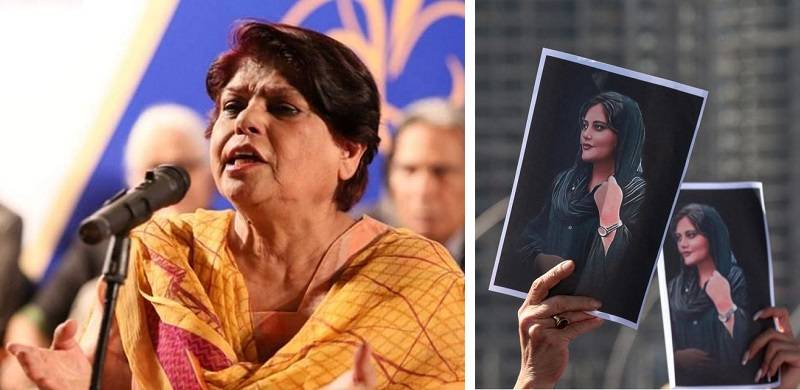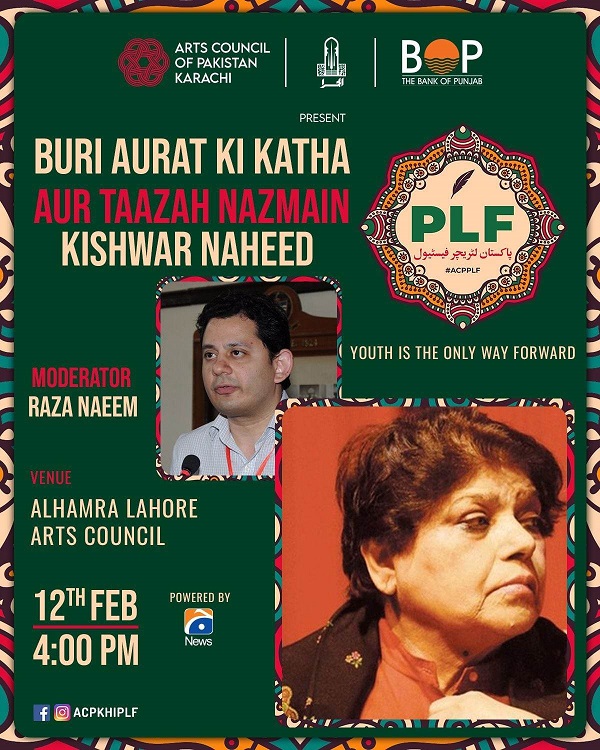

Since the unfortunate death of Amini in police custody, not only have Iranian women been at the forefront of the Iranian protest movement but their daring step has found massive support among Iranians of all walks of life – from the Iranian soccer team at the 2022 FIFA World Cup to the members of Iran’s much-vaunted film fraternity. The memorable slogan of the Iranian protest movement “Zan, Zindagi, Azadi” (“Woman, Life, Freedom”) echoes the rallying cry of another martyr in a different part of the world, the unfortunate African-American George Floyd, whose last words before being asphyxiated to death in Minnesota on 25 May 25 2020 “I Can’t Breathe” gave rise to the powerful Black Lives Matter movement across the United States.
Kishwar Naheed (b. 1940) has the distinction of being one of the greatest Urdu poets now living. Her life, writings and activism against patriarchy and dictatorship in Pakistan as one of the pioneers of feminist Urdu poetry is well-documented. She is probably the first Urdu poet to give a voice to Mahsa Amini, the young martyr of Iran’s rekindled feminist movement – with one of her latest poems simply titled Mahsa Amini.
She begins her poem by noting that even in Biblical times, while the Egyptian women were cutting their fingers, smitten by Joseph’s beauty, nobody dared make them captive by invoking religious injunctions:
Jis vaqt zanan-e-Misr
Yusuf ka deedar karte hue
Apni ungliyan kaat rahi theen
Unhen kisi ne mazhab ki
Zanjeer nahi pehnai thi
She then goes on to invoke the Iranian feminist pioneering poet Forough Farrokhzad, her contemporary resistance poet Ahmad Shamlou and the just-released acclaimed filmmaker Jafar Panahi to the cause of her heroine,
Forough Farrokhzad ke mulk mein
Auraten scarf aur dopatte jala rahi hen
Ehtijaj mein baal kaat rahi hen
Shakhsi azadi ke liye…
Ahmad Shalou aur Jafar Panahi
Keh rahe hain ‘Zan, Zindagi, Azadi’
Before finishing her poem by reminding the custodians of morality that as per Muslim beliefs, it will be by their mothers’ names that they will be identified on the Day of Judgement; but even on that greatest Day of all days, these bearded grandees will be running after unveiled women rather than caring for their own salvation:
Aur dunya ke tamam
Imam-o-shuyukh ko yad dilaun
Jab qabr se uthaye jayenge
Maan ke naam se pukare jayenge
Is din nasiheen ko
Apni bakhshish ki fikr ho gi
Ke is vaqt bhi auraton ko
Hashr ke maidan mein
Hijab pehnane ko bhagte rahen ge
So, on the 44th anniversary of the Iranian Revolution today, Kishwar Naheed’s posthumous tribute to one of its youngest martyrs – Mahsa Amini – is being presented here in an original English translation, which is also a paean to Iranian women, Iranian lives and Iranian freedom.
At the time
The women of Egypt
While beholding Joseph
Were cutting their fingers
No faith had placed them in fetters
The Guardians of the land of Hafez and Saadi
Killing a young girl while warning her
Consider it real Islam
In the land of Forough Farrokhzad
Women are burning scarfs and stoles
Cutting their hair in protest
For personal freedom(s)
Women around the world are chanting slogans
Ahmad Shamlou and Jafar Panahi
Are saying ‘Zan, Zindagi, Azadi’
Those who have made the meadow of faith into a wilderness
Would make even the trees veil themselves had they power (over them)
They begin to lick their lips even
Upon seeing the waving branches
In the corridors of beliefs
To those who imprison women
And all the leaders and aged men
Should I remind
That when they will be raised from the grave
They will be called by the mother’s name
That day the preachers
Will be worried about their forgiveness
In that at that time too
In the field of Doomsday
They will be running to veil the women
Note: The author will be in conversation with Kishwar Naheed about her pathbreaking autobiography on Sunday 12 February 2023 at the Pakistan Literature Festival in Lahore

